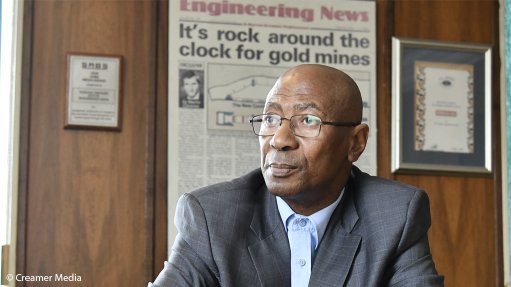Lithium Universe unveils plans for Quebec refinery project


Access to low-cost, green energy makes Quebec a prime location for lithium conversion.
Australian company Lithium Universe is progressing its strategy to address the “lithium conversion gap” in North America by establishing a Canada-based lithium chemicals operation. The company plans to source spodumene feedstock from both domestic and international suppliers, including Brazil and Africa, to produce battery-grade lithium carbonate.
On Monday, Lithium Universe, which launched in August last year, announced plans for an 18 270 t/y lithium carbonate refinery in Bécancour, Quebec.
"Early on, we recognised that bridging the lithium conversion gap in North America, leveraging our accumulated lithium expertise and the proven technology from Jiangsu, was a clear and strategic path forward," said chairperson Iggy Tan.
Tan, a leader in the lithium industry, previously spearheaded Galaxy Resources and oversaw the development of the first large-scale vertically integrated mine-to-refinery project, which included the one-million-tonne-a-year Mt Cattlin spodumene mine and a 17 000 t/y Jiangsu refinery.
A newly completed prefeasibility study has confirmed the economic viability of the Bécancour refinery, even under challenging pricing conditions. The study estimates an after-tax net present value of $501-million at an 8% discount rate. The financial model is based on spodumene concentrate (SC6) pricing at $1 170/t and battery-grade lithium carbonate equivalent pricing at $20 970/t.
Once fully operational, the project is projected to generate annual revenues of $383-million, with costs estimated at $236-million, resulting in earnings before interest, taxes, depreciation, and amortisation of $147-million. The capital cost for the refinery is estimated at $494-million.
Tan noted that Lithium Universe was exploring strategic partnerships to help finance the project. He highlighted strong interest from original equipment manufacturers seeking spodumene offtake supply options outside China.
Lithium Universe’s counter-cyclical strategy, advancing projects during market downturns, is aimed at positioning the company for growth when market conditions improve. Tan pointed out that the current lithium price depression had driven out weaker competitors, leaving an opportunity for well-prepared companies to advance their projects.
“We are committed to funding and building a low-risk lithium conversion refinery in Quebec, taking the first step toward establishing the province as a lithium conversion hub for the trans-Atlantic region,” he said.
Currently, more than 90% of global lithium iron phosphate (LFP) battery manufacturing is concentrated in China. However, North America is rapidly increasing its capacity. Lithium Universe referenced major developments in the region, including Ford’s plans for a $3.5-billion factory in Michigan, with a 35 GWh/y capacity by 2026, Tesla’s facility in Nevada, and LG Energy Solutions’ $5.6-billion investment in Arizona for LFP battery production.
By 2028, North America is expected to add nearly 1 000 GWh of battery manufacturing capacity, supporting the production of 10-million to 13-million electric vehicles (EVs) a year. Key states such as Georgia, Kentucky and Michigan are leading this growth, with Canada also playing a significant role through partnerships with companies like Volkswagen and Stellantis.
Lithium Universe estimates that by 2028, North America will require around 850 000 t/y of lithium carbonate equivalent (LCE) to meet rising demand for EVs and energy storage systems. Currently, there are no operational lithium converters in North America, and only about 100 000 t/y of LCE hard rock converters are planned for construction by 2028.
Quebec is emerging as a prime location for lithium conversion, with Lithium Universe citing its access to low-cost, green energy priced at just $0.026/ kWh. This advantage is expected to make the lithium refining process both cost-effective and sustainable, further strengthening the region's potential as a trans-Atlantic hub for lithium production.
Meanwhile, Lithium Universe has drawn on lessons from past failed Western lithium conversion projects and believes it has a “straightforward” solution.
The company noted that conversion technology challenges were at the heart of several failed projects, including the North American Lithium and Nemaska Lithium projects, in Canada.
Lithium Universe’s solution is to leverage “the proven success” at the Jiangsu lithium refinery and to assemble a team of lithium experts who have successfully built and operated the Jiangsu refinery for Galaxy Resources.
Hatch Engineering, the firm responsible for constructing the Jiangsu plant, has been selected as the engineering partner for this project.
To mitigate technology risks, Lithium Universe will model the Jiangsu plant strategy, using the same process, equipment, and supplier strategy. This will also reduce the engineering work required for the preliminary and definitive feasibility studies.
Further, with the same supplier strategy, Lithium Universe can benefit from the original supplier’s design and construction experience, minimising costs and time associated with repeated detailed engineering.
“All lessons learned from Jiangsu have been integrated into the proposed Bécancour plant design,” states Lithium Universe.
Article Enquiry
Email Article
Save Article
Feedback
To advertise email advertising@creamermedia.co.za or click here
Comments
Press Office
Announcements
What's On
Subscribe to improve your user experience...
Option 1 (equivalent of R125 a month):
Receive a weekly copy of Creamer Media's Engineering News & Mining Weekly magazine
(print copy for those in South Africa and e-magazine for those outside of South Africa)
Receive daily email newsletters
Access to full search results
Access archive of magazine back copies
Access to Projects in Progress
Access to ONE Research Report of your choice in PDF format
Option 2 (equivalent of R375 a month):
All benefits from Option 1
PLUS
Access to Creamer Media's Research Channel Africa for ALL Research Reports, in PDF format, on various industrial and mining sectors
including Electricity; Water; Energy Transition; Hydrogen; Roads, Rail and Ports; Coal; Gold; Platinum; Battery Metals; etc.
Already a subscriber?
Forgotten your password?
Receive weekly copy of Creamer Media's Engineering News & Mining Weekly magazine (print copy for those in South Africa and e-magazine for those outside of South Africa)
➕
Recieve daily email newsletters
➕
Access to full search results
➕
Access archive of magazine back copies
➕
Access to Projects in Progress
➕
Access to ONE Research Report of your choice in PDF format
RESEARCH CHANNEL AFRICA
R4500 (equivalent of R375 a month)
SUBSCRIBEAll benefits from Option 1
➕
Access to Creamer Media's Research Channel Africa for ALL Research Reports on various industrial and mining sectors, in PDF format, including on:
Electricity
➕
Water
➕
Energy Transition
➕
Hydrogen
➕
Roads, Rail and Ports
➕
Coal
➕
Gold
➕
Platinum
➕
Battery Metals
➕
etc.
Receive all benefits from Option 1 or Option 2 delivered to numerous people at your company
➕
Multiple User names and Passwords for simultaneous log-ins
➕
Intranet integration access to all in your organisation



















